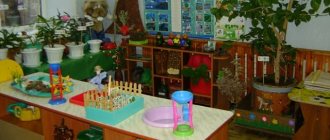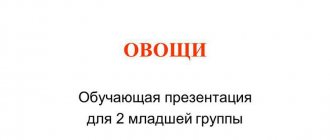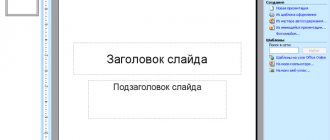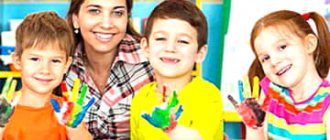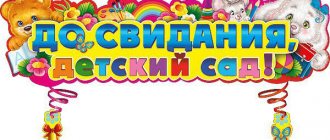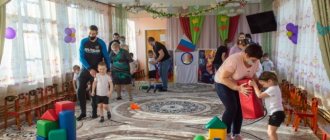Explanatory note
The Federal State Educational Standard for Preschool Education defines targets at the stage of completion of preschool education: “. the child masters the basic cultural methods of activity, shows initiative and independence in various types of activities - play, communication, cognitive and research activities, design, etc.; able to choose his own occupation and participants in joint activities.” (clause 4.6.)
Childhood is a time of active social “development” of a growing person and his assimilation of sociocultural achievements and values, a period of testing and self-determination in constantly expanding and increasingly complex contacts.
Preschool age is traditionally considered a period of intense socialization. Modern children live and develop in completely new sociocultural conditions. The extreme employment of parents, the generation gap, the isolation of the child in the family and other trends negatively affect the socialization of modern children. Effective socialization is one of the main conditions for a child’s life in society in general and the child’s personal readiness for school in particular.
Currently, great importance is given to volunteer work in social society. The institution of volunteering is widespread in many countries. Moreover, the work of volunteers is becoming more and more significant every year in Russian cities.
Volunteer (French volontaire - volunteer) is any individual, including foreign citizens and stateless persons, who contributes to the development of volunteerism by carrying out volunteer activities.
Volunteering is a wide range of activities, including traditional forms of mutual aid and self-help, formal service provision and other forms of civic participation, that are carried out voluntarily for the benefit of the general public without expectation of monetary reward.
Volunteering is based on voluntary work that does not require payment. Consequently, his motives are not in material rewards, but in satisfying social and spiritual needs. Volunteer activities are:
• planting flowers, bushes and trees;
• assistance to such social categories of citizens as: the elderly, street children, youth and students, the homeless, people with disabilities (disabled people), migrants, refugees, former prisoners and others;
• improvement and arrangement of courtyards, plots, city streets;
• helping animals;
• educational conversations;
• charity concerts and theatrical performances;
• environmental marches, garbage and pollution removal;
• promotion of healthy lifestyles; and etc.
A volunteer values such personality traits as hard work, kindness towards people around him, care and respect for nature, responsiveness and mercy, and a strong need for a healthy lifestyle.
The importance of labor as a factor in the development of a child’s personality is reflected in the history of Russian pedagogy: the works of V.A. Sukhomlinsky, P.P. Blonsky, A.S. Makarenko. Of no small importance are the studies of Ya.Z. Neverovich, T.A. Markova, who showed that the main motive that encourages children to work is their desire to help adults.
I.A. Knyazheva, in her dissertation “Pedagogical conditions for the education and development of mercy in children of senior preschool age,” considers mercy as the ability to take pity on the unfairly offended, the weak, the small, the sick, regardless of their external attractiveness; selflessly help those in need without reminders or prompts; give up something meaningful and interesting for the child.
The formation of goodwill in preschoolers was considered in the works of L.M. Shipitsyna, O.V. Zashirinskaya, E.I. Kulchitskaya. P.G. Samorukova studied the caring attitude of preschool children to nature.
The volunteer movement has a number of features, provided that it is organized in a preschool educational institution.
A pressing issue is the creation of a volunteer movement in kindergarten as a social institution that should prepare for life. And life is not only about academic knowledge. This is the development of certain life qualities:
- responsibility;
- mercy;
- independence;
- ability to communicate with different social groups of people;
- personal positivism.
Preschool age is characterized as a period of sensitivity for the development of all mental functions, as well as an important stage in the development and formation of the child’s personality. This served as an incentive to create a volunteer movement in kindergarten, because it is in preschool age that the above-mentioned personal qualities of children are formed.
The novelty lies in the fact that the organization of the volunteer movement is supposed to take place in a kindergarten.
Problem: Lack of experience among children of senior preschool age in demonstrating a social and moral position associated with various aspects of human social life in all their integrity and diversity.
Project goal: To introduce volunteer practice into the group’s activities aimed at developing the spiritual and moral personality of preschool children.
Organization of the volunteer movement “On the Road of Good” in kindergarten through the association of teachers, interested parents and children of senior preschool age and their participation in volunteer events.
Tasks:
- Expand the understanding of the volunteer movement among children 5-6 years old and parents of group students.
- To provide practical skills for participating in the volunteer movement to all participants in the educational process.
- Draw up an action plan and implement it during the 2021–2022 academic year.
Presentation on the topic: Memos for parents
Slide description: What you need to teach your child To love yourself. Until a child values his own life, he will not become active, which means he will not be able to realize himself. Interpret behavior. A child finds himself in various life situations in which he may simply become confused. If a child has learned to understand and explain people's behavior, he will not be inclined to get upset in such situations. The child must be taught to explain his own behavior. He will be able to explain how he behaved in class, whether it was good or bad, why it happened to him and how he felt. Then he will be better able to understand what they want from him, what he is doing wrong and why this happens to him. Communicate using words. A child who can explain what is happening to him in words helps others better understand himself and thereby relieves many problems and troubles. Understand the differences between thoughts and actions. A child cannot feel one thing, think about another, and act in a third. He has childlike, clean communication. If he is worried about something, we need to teach him to talk about his feelings, and not translate them into constant thoughts that he is afraid or embarrassed about. It is recommended to help the child react to his negative emotions through a story, game, dramatization, drawing, pantomime: “Draw, show, tell, play out what is bothering you now, and then we will start doing homework with you!” Be interested and ask questions. All the talk about preparing children for school, interest in learning, and cognitive abilities will be unnecessary if we stop being interested in and responding to the wonderful questions that children ask themselves and those around them: “Why doesn’t the sun fall from the sky?” etc. Understand that there are no simple answers to complex questions. The child will face serious issues, social and scientific problems in life. There is no need to constantly tell him: “You’re still small,” “It’s none of your business,” “When you grow up, you’ll understand.” You can lift the veil and show that not all questions have clear answers. By doing this, we will develop the child’s stereoscopic, global, and not just black-and-white thinking. Do not be afraid of failures. To learn anything, a child should not be afraid of mistakes and failures. Children need to be helped to understand that they can learn from mistakes. Moreover, children should not be humiliated and punished for this. A child who is afraid of mistakes and failures will grow up to be an insecure person, a real loser. Trust adults. A child needs to trust adults, but trust is destroyed if parents, to please the child, constantly play different games with him and deceive him: “Eat porridge, you will become big,” “Mom always tells the truth,” “Dad is the strongest and bravest.” Think for yourself. A sense of one's uniqueness and ability to choose is a vital part of human existence. This ability is easy to teach if you simply encourage the child to express his judgment without fear of being punished or laughed at.
Project passport
1.Name of the project “On the Road of Goodness”
2.prepared the project: Svetlana Mikhailovna Dedkova, teacher of the II qualification category, Diana Saitovna Suleymanova, teacher of MADOU DS No. 29 “Yolochka”, Nizhnevartovsk.
3.Participants: group
4 Type of project: educational, creative, social informational, individual development.
5. Project participants: teacher, middle group students, parents of students
6. Educational area: social and communicative development, cognitive development, artistic and aesthetic development, speech development, physical development.
7. Project type: long-term
8.Material base: tools for cleaning the area, tools for decorating a volunteer’s corner, consumables for making toys and gifts, a camera.
9. Implementation period: from September 1, 2021 to May 25, 2022
Presentation for parents Presentation for the lesson (senior group)
Slide 1
“Municipal budgetary preschool educational institution Kindergarten of a general developmental type with priority implementation of activities for the social and personal development of children No. 39 “Romashka” of the urban district “Yakutsk city” Educators: Marianna Vasilievna Grigorieva Education: higher NEFU PI, teaching experience 24 years. Category: higher Mokhnachevskaya Aitalina Gavrilevna Education: higher, NEFU PI Teaching experience: 4 years. Category: SZD Assistant-educator: Lazareva Praskovya Mikhailovna Group “EMERALD CITY”
Slide 2
In our group “Emerald City” there are 42 children, of which 14 are boys and 28 are girls.
Slide 3
Throughout the year, our group has been working on the general education program of preschool education “From birth to school” edited by N.E. Veraksy, T.S. Komarova, M.A. Vasilyeva. The program provides for solving educational problems in the joint activities of an adult and a child, and in the independent activities of children not only within the framework of direct educational activities, but also during routine activities. The program is also aimed at creating conditions for the successful adaptation of children to the conditions of kindergarten: introducing parents to the age characteristics of children.
Slide 4
DAY REGIME Reception and examination, games, duty, morning exercises 7.30-8.30 Preparation for breakfast, breakfast 8.30-9.00 Organized educational activities 9.00-9.25 9.30-10.00 Preparation for second breakfast, second breakfast 10.00-10.20 Preparation for a walk, walk (games, observations, work) 10.20-11.05 Returning from a walk, games 11.05-11.50 Preparing for lunch, lunch 11.50-13.00 Preparing for bed, afternoon nap 13.00-15.00 Gradual rise, air, water procedures 15.00-15.15 Preparation for afternoon snack, afternoon snack 15.15-15.3 0 Games, independent activities for children 15.30-15.55 Activities 16.00-16.30 Preparing for dinner, dinner 16.30-17.05 Preparing for a walk, walk, games, children going home 17.05-19.15
Slide 5
SCHEDULE GRID OF EDUCATIONAL ACTIVITIES Monday FCCM 09.00-09.25 Music 09.35-10.00 Drawing 10.00-10.35 Tuesday Speech Development 09.05-09.30 Physical Education 09.35-10.00 Wednesday Music 09.00-09.25 Mathematics 09. 35-10.00 Drawing 10.00-10.35 Thursday Speech development 09.00-09.25 Physical education 09.35-10.00 Friday Modeling/Applique 09.00-09.25 Construction 09.35-10.00
Slide 6
Educational area “Speech development” - use complex sentences of different types; - independently compose stories based on a model about events from personal experience; - retell short literary works; - replace a word with another word with the original meaning; - know and name your relatives, home address; - know the name of your hometown, country, its capital; - analyze the results of observations and draw conclusions about some patterns and relationships in nature; - determine the place of a sound in a word;
Slide 7
Formation of elementary mathematical concepts. - compare parts based on counting objects and making pairs; — count (count out) within 10; - correctly use cardinal and ordinal numbers, answer the questions “How much?”, “Which one?”; - compare adjacent numbers within 10, determine which number is greater (less) than the other; equalize unequal groups of objects; - compare objects by eye (by length, width, height, thickness); using overlay, application to the eye; - determine your location among objects and people; - distinguish the shape of objects; -know that morning, afternoon, evening, night make up a day; sequence of parts of the day; - name the current day of the week
Slide 8
Fiction. - determine the genre of the work; name your favorite fairy tales and stories; - show interest in voluminous works; - dramatize short works, read poems by role; - remember 2-3 program poems (if necessary, remind the child of the first lines), riddles;
Slide 9
Game activity. — negotiate with partners what to play, who will play who in the game; - obey the rules of the game; - use substitute items; - in didactic games, evaluate your capabilities and accept loss without irritation; — explain the rules of the game to peers; - use various sources of information that help enrich the game (cinema, literature, excursions..);
Slide 10
Club work “Design and Robotics” Supervisor: M. Grigorieva Crafts from construction sets Work according to a given scheme Manufacturing according to plan Participation in competitions “Magic threadography” Supervisor; Mokhnachevskaya A.G. creating paintings from threads to develop hand-eye coordination; geometric figures.
Road map:
Implementation of step #1
| № | Event | Deadlines |
| 1 | Determining the goals, objectives and relevance of the project | September |
| 2 | Preparing a long-term project plan | September |
| 3 | Determining the implementation period and project participants | September |
Implementation of step No. 2
| № | Event | Deadlines |
| 1 | Preparation of changes to the organization and system of additional education in preschool educational institutions (planning additional activities, classes, excursions, etc.). | Constantly |
| 2 | Identification of project risks and ways to solve them | September |
Implementation of step No. 3
| № | Event | Deadlines |
| 1 | Preparation of the material base for the implementation of the project | October December |
| 2 | Carrying out activities with project participants | Constantly |
